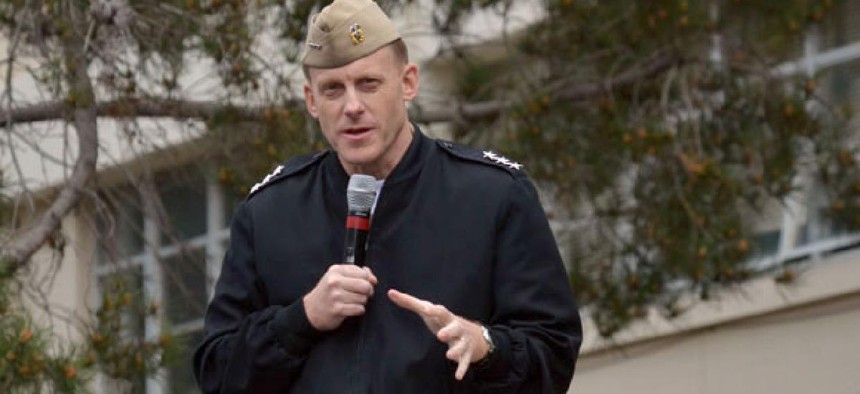Defense officials: Sequestration cuts would be 'devastating' for cybersecurity

Navy Vice Adm. Michael Rogers said he worries that the mandatory cuts would prevent him from being able to protect vital programs. United States Navy file photo
Pentagon says past advancements could be undone with cuts.
Potential budget cuts under sequestration would take a major toll on efforts to fight cyberthreats, top officers from each of the military branches warned a House Armed Services subcommittee on Wednesday.
“It would be devastating,” Air Force Maj. Gen. Suzanne Vautrinot told the House Armed Services Emerging Threats and Capabilities Subcommittee.
Not only would current efforts to boost military cybercapabilities falter, but past advancements could be undone, she said. “We would actually lose ground in this important area.”
Vautrinot’s fears were echoed by Marine Corps Lt. Gen. Richard Mills, who said that across-the-board cuts, which would happen if Congress doesn’t agree on budget measures, could undermine efforts to retain and train enough people to handle cybersecurity operations.
In addition, the speed at which various military cyber programs have to acquire new technology, such as software, means that any cuts could disproportionately hurt cybersecurity, he said.
Navy Vice Adm. Michael Rogers, commander of the U.S. Fleet Cyber Command, said he worries that the mandatory cuts would prevent him from being able to protect vital programs.
Lawmakers on the panel questioned whether the military could retain and train enough people to man the keyboards at the various cyber commands.
The federal government needs 20,000 more cybersecurity professionals, on top of the 117,000 full-time civilian, contractor, and military employees already dedicated to the problem, according to an estimate by Ed Giorgio, former chief cryptographer at the National Security Agency, and Alan Paller, director of research at the SANS Institute, a cybersecurity training organization.
Meanwhile, the number of computer-science graduates dropped from 60,000 in 2004 to just 43,000 in 2007, the latest year for which data are available, according to the National Center for Education Statistics.
Despite the concerns over lean government budgets and competition from civilian cybersecurity firms, the panel of leaders agreed that the military is, in general, hanging on to its most talented cybersecurity troops.
“Increasingly these men and women view themselves as warriors,” said Rogers, who added that retention has exceeded his expectations. That opportunity to be a “cyberwarrior” is not found at private companies, even if they offer potentially more lucrative pay, he said.
The Senate is on the verge of considering broad cybersecurity legislation that would, among other things, boost federal efforts to train and recruit cybersecurity professionals.
NEXT STORY: Discovery highlights how malware goes undetected





